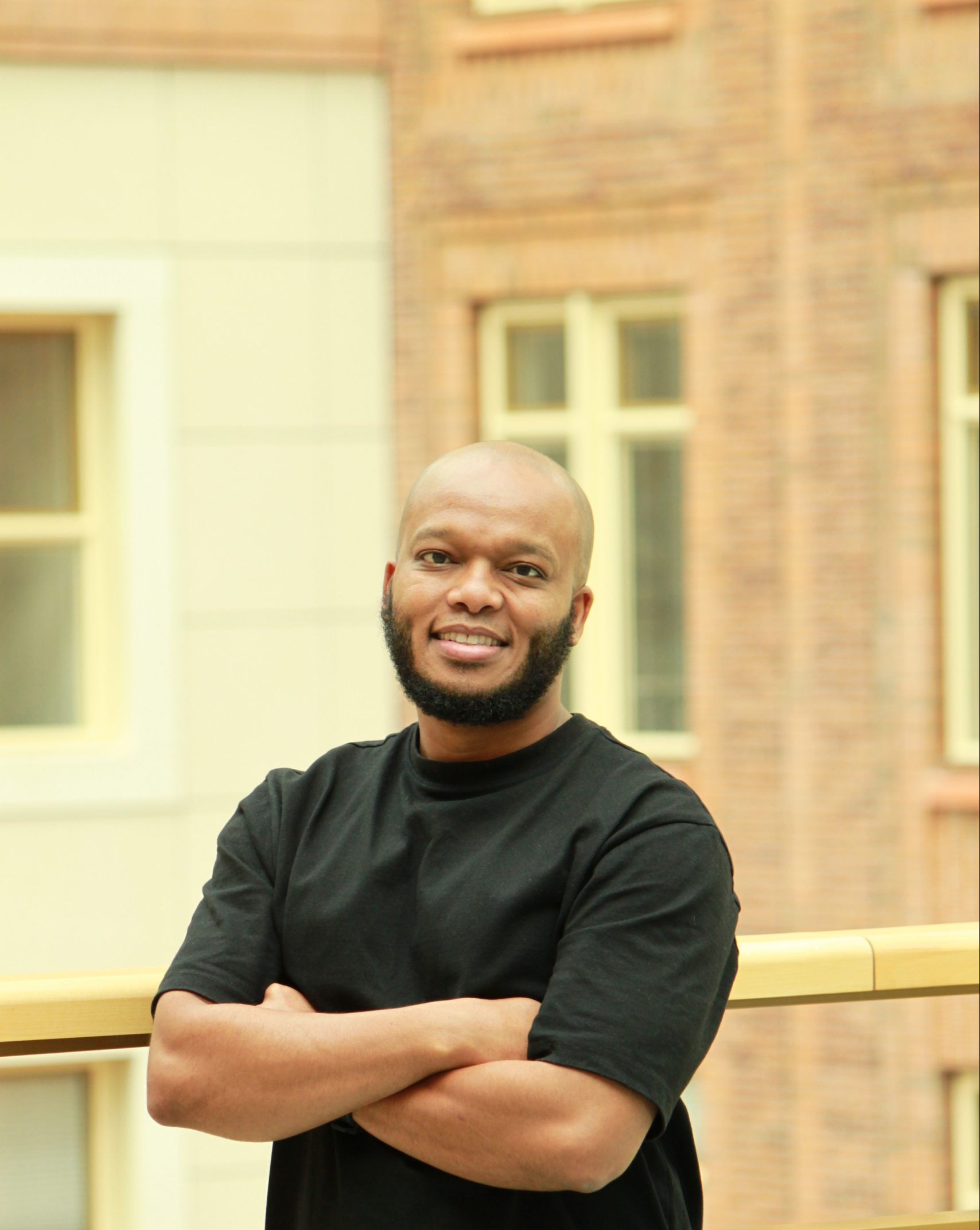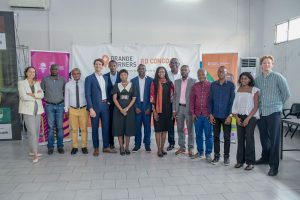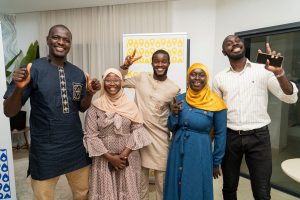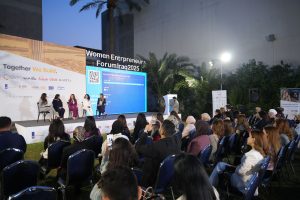Meet Claybourne Appies. With Deaftouch, this Orange Corners South Africa alum is on a mission to shatter barriers and create economic inclusion for people with disabilities. Fueled by personal experiences and a passion for accessibility, Claybourne is spearheading initiatives like the first deaf-to-deaf outsourced call centre in South Africa and an innovative app for on-demand sign language interpreters. His vision is clear: to empower marginalised communities with the resources and opportunities to thrive independently. During his recent visit to the Netherlands, we spoke to Claybourne about how Deaftouch is transforming lives.
Hi Claybourne! Could you tell us a bit more about yourself, your business and what brought you here to the NL?
I’m Claybourne, founder of Deaftouch. Deaftouch exists because I’ve come to discover the importance of accessibility as a tool to create economic inclusion for two groups: people with disabilities and previously disadvantaged groups. These two groups have really experienced a great deal of marginalisation. Deaftouch wants to be a bridge, equip them with the necessary resources to live their lives independently. That way, we create a more inclusive society that everyone can participate in as equally as possible.
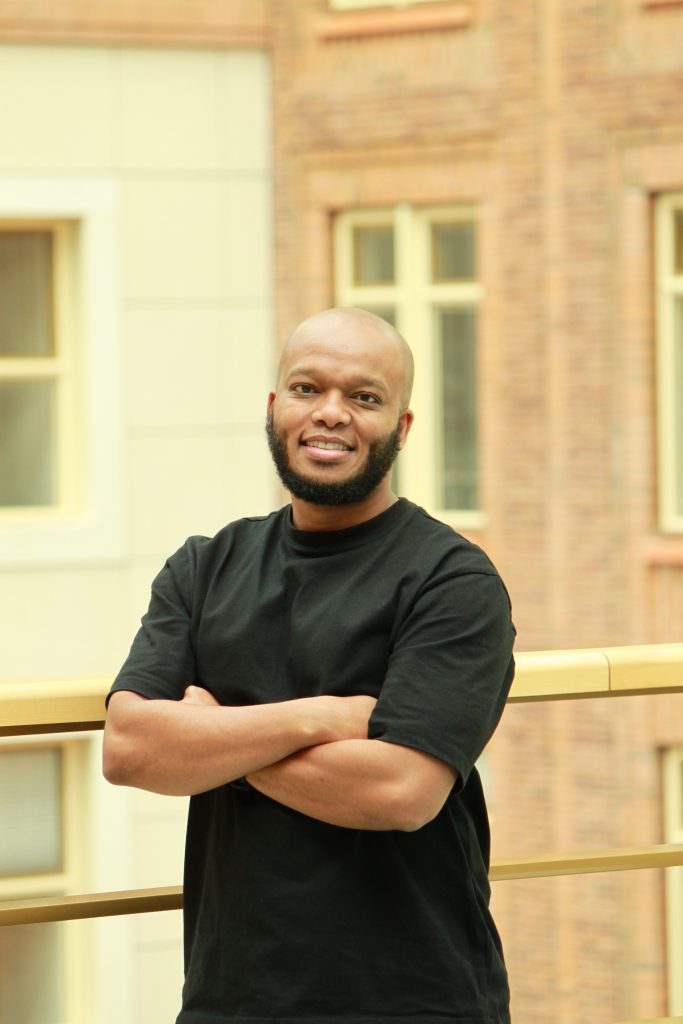
Deaftouch works with the communities we serve, to find solutions that are applicable to them, as opposed to the one-size-fits-all approach. We’re currently working on two projects: we’re looking to establish the first sign language customer support service in the form of a deaf-to-deaf outsourced call centre in South Africa. And we’re also developing an app for on-demand access to sign language interpreters.
In South Africa, we have a huge challenge in the deaf community with both education and unemployment. With Deaftouch, we upskill this marginalised group and bring them into the workplace. We ensure they not only have the access, but also the skills to have a good job, so that they can participate economically. The deaf-to-deaf call centre will directly employ deaf individuals, and through our sign language access app Lindi we’ll train youths from disadvantaged backgrounds to be qualified sign language interpreters, who can then find work through the app. In both cases we aim to ensure that they have tools and the resources to create independent lives for themselves.
In the past we’ve also done more research and advocacy-based projects. The disabled community is governed by a ‘nothing about us without us’ ethos, and we want to be more than just another organisation out there to use them. That’s why we partner with South African organisations like Deaf Empowerment Firm and Yellow Owl to develop our solutions, for example.
Our advocacy work is related to raising awareness and creating opportunities for the deaf community to be heard. So that the debacle around the funeral of Nelson Mandela for example, where they used a sign language interpreter that wasn’t qualified, won’t happen again. This was a really important moment to show the importance of trained sign language interpreters and taking the community seriously.
Deaftouch aims to ensure that deaf individuals and youth from disadvantaged backgrounds have tools and the resources to create an independent life for themselves
Claybourne Appies, founder of Deaftouch
You’re not deaf or disabled yourself. How did you end up doing this work?
Many years ago, I saw a deaf colleague using a Nokia 3310 to communicate with his hearing colleague. They used the message box to type what they needed to say to each other. That’s when I thought ‘one day I should do something about this!’ Fast forward a few years, I’m sitting in a call centre and I receive a phone call from a very desperate mother. I was in the insurance industry, selling short-term insurances. The mother had a really hard time finding an insurance company that would accept an insurance in her daughter’s name, as the daughter was deaf and they couldn’t communicate the terms and conditions to her. I went to my management and our legal team, arguing this was a problem that needed to be solved. After a lot of debating and fighting, they finally agreed to insure her, but on the condition that the mom became responsible for the communication. That’s problematic, because the mom wasn’t an insurance professional, and as insurance professionals we go through quite a bit of training to become certified. There was a lot of potential for miscommunication. And what would happen after the daughter was insured, how would communication happen? It took us five days to conclude that contract, which would normally have taken 20-25 minutes. This is unacceptable for the company as well as the client. Something had to be done, so I set out to find a solution.
You joined Orange Corners in 2022. Can you take us back to that moment, what did Deaftouch look like?
When we joined Orange Corners, we were still very much in the ideation stage. We had only looked at different solutions and their possibilities. There is some entrepreneurship in my family, but I didn’t really know what it’s like to be an entrepreneur or set up a business. Looking back, there’s so much more that I know and understand now because of Orange Corners. We refined our marketing, looked at different business models and strategies, were introduced to business finance. And pitching! I ended up in the Netherlands because I won the pitching competition.
Pitching training is so crucial. There were a few other businesses that were also pitching, businesses that are doing great things, that have more traction or revenue than us. But being able to sell your idea and sell it well, being able to talk about your business in a way that people understand it and want to buy in, that’s so important. Whether they’re customers or partners. This was something that was well emphasised in the programme, and also well-managed.
It is so important to be able to sell your idea and sell it well, that that people understand it and want to buy in!
Claybourne Appies, Deaftouch
How’s your experience in the NL been so far?
Being here with Orange Corners in the Netherlands has been one of the most mindshifting experiences I’ve ever had in my life. Yesterday I stood in a very busy Den Haag Centraal station, and I saw a gentleman who’s blind navigate the station with his walking stick, following accessiility infrastructure built for him. He’s able to go wherever he wants to go almost independently. That’s access. He isn’t restricted because of his disability.
I’m really impressed with how intentional your government is about accessibility. That’s something other countries can definitely learn from. Laws, policies and regulations are crucial to ensure that both the public and the private sector take accessibility serious. More than 75% of the deaf and hard-of-hearing individuals in South Africa alone are unemployed. Only 20% of the deaf community graduates from secondary school. That’s unacceptable. Governments should come to the table and partner with organisations such as Deaftouch and the many others that exist to create a more economically inclusive community that’s accessible to everyone.
I’m really impressed with how intentional the Netherlands government is about accessibility
Claybourne Appies, Deaftouch
From the minute I landed in the Netherlands, I felt very welcomed. The first two days I took part in the Orange Corners Connect Days, for example visiting some of the amazing incubators based in Rotterdam and learning what they’re doing to help anyone wanting to enter the entrepreneurship space. They opt in from the idea stage to accessing markets and growing. So there’s an extraordinarily amazing ecosystem.
For the other days, Sebastiaan from Orange Corners set up different conversations with possible partners, giving me a good idea of how accessibility is done here in the Netherlands. I had the opportunity to visit a parent group who work with the deaf community. We also visited Optelec, who work with the blind community. They’re going to introduce me to their South African counterpart, so we can look into employing blind people for the call centre as well. I also visited Berengroep where I got to experience the amazing work they’re doing firsthand. And then we still have two additional conversations with Zarttech and Envision. Zarttech is within the entrepreneurial eco space, they help building and growing businesses. And Envision is also in the accessibility space, working on innovative solutions for the blind. So we’ve been visiting amazing organisations every single day. That’s encouraging because no man is an island, and it really takes an ecosystem to raise a startup.
I also had the opportunity to attend Startup Night Africa NL with the Lionesses of Africa. We saw ten amazing female entrepreneurs pitch their businesses. It was a great event, connecting and networking. And what’s really awesome to see was how big a presence South Africans have. The host was South African, a few female entrepreneurs pitching were from South Africa. And it’s amazing to see how Orange Corners is linked to the Lionesses of Africa. These connections can take your business from South Africa to here or take your business from here to South Africa.
This last week has been such an accelerated path, opening my mind not only to the possibilities of accessibility, but also introducing me to important areas you have to focus on when building a business with the potential to become a global player. So I’ll be taking back with me a lot of learnings, a bigger network, and encouragment that it’s possible to do great things.
No man is an island. It takes an ecosystem to raise a startup!
Claybourne Appies, Deaftouch
You have that ambition, to become a global player?
Both our products are very scalable! For the deaf-to-deaf call centre, we work in outsourcing. Globally, this is quite a big business. In South Africa alone, business process outsourcing contributes $50 billion in Gross Domestic Product. And they’re large-scale employers – their target for 2030 is 500,000 jobs created. Deaftouch can train agents in different sign language dialects, or alternatively, employ agents that speak different sign language dialects. But partnerships are obviously very important, because each country already has established organisations and it’s always better to collaborate with them, as opposed to thinking that you can do something in a different country on your own. And our Lindi app is a marketplace that allows both deaf and hearing alike to access on-demand sign language interpreters to assist with communication in both digital and in-person settings. This is also very scalable. Because of the different sign language dialects that exists, we could potentially create jobs internationally!
So, what’s next for you?
Early August we aim to launch the pilot for the deaf-to-deaf call centre. We already have the infrastructure – a call centre, the human resources to recruit and train our agents, the technology. We just need a little bit more funding to meet the operational requirements. And we’re building the prototype for the Lindi app. The prototype and the testing of it will soon be completed, so hopefully by September – Deaf Awareness Month – we’ll be able to launch one or two of these projects in the market!
Follow Claybourne’s Deaftouch online:
Website
LinkedIn
Facebook
Instagram
X

